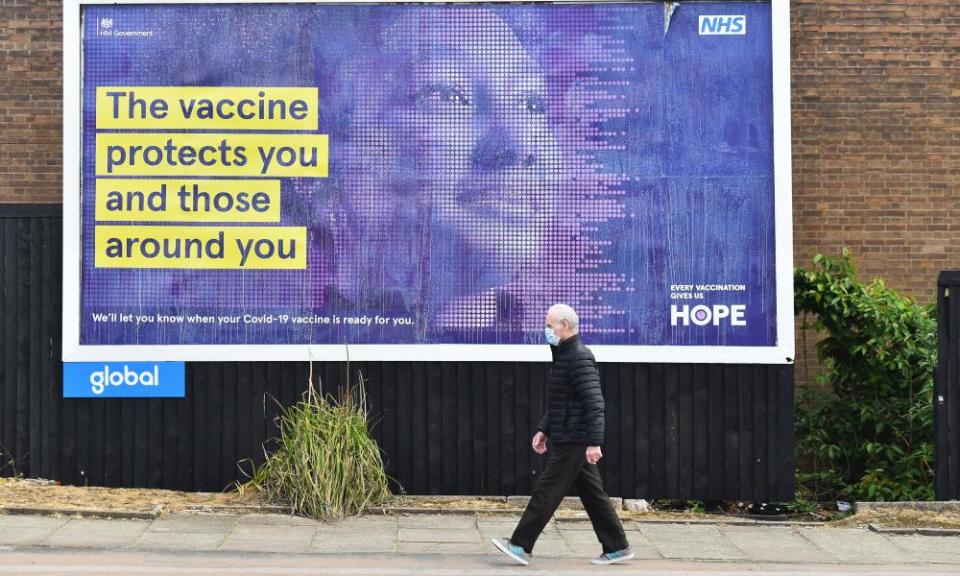With 21 million still unvaccinated, Britain is not out of the woods yet

This week the steady rise of Covid cases in the UK was accompanied by a worrying signal of rising hospital admissions. Of most concern was the notable increase in the number of people becoming severely ill and requiring mechanical ventilation. It seems clear that the UK has entered a third Covid-19 wave, which raises the question: to what extent will vaccines protect the NHS from unmanageable strain?
The growth of Covid cases across the UK should come as no surprise. The Delta variant is now clearly established and has 20%-60% higher transmissibility than the previous Alpha variant. According to Public Health England, there were 35,204 new cases resulting from the variant last week, and 117 deaths of people confirmed to have the variant and to have had a positive test in the last 28 days. A single dose of the vaccine is also less effective against this new variant. Reported cases continue to be concentrated in younger age groups, many of whom will only now be receiving their first vaccinations. So, while 60% of the adult population is now fully vaccinated, 40% remain susceptible – some 21 million people. Coupled with children, this large unvaccinated population is clearly sufficient to drive a third wave of cases. The issue now is whether high vaccine uptake in the UK has broken the link between cases, hospitalisations and deaths.
Although vaccines are having a major impact both in reducing the level of virus circulating in the community and in limiting the number of people requiring hospitalisation, they should not be viewed as a magic bullet. Vaccines are imperfect; a fraction of those who are fully vaccinated will still become infected and develop mild symptoms, while a smaller fraction may require hospitalisation and be at risk of dying.
Uptake of vaccines has been remarkably high across the UK, with 96% of adults aged 50 and over having received at least one dose and 92% fully vaccinated according to the latest reports from NHS England (with similar levels across Scotland, Northern Ireland and Wales). The latest data from Public Health England shows that the vaccines reduce the risk of hospital admission (and hence death) by close to 95%.
However, if all adults over 50 were exposed to the virus, the 4% of those who have not been vaccinated would remain at risk, while 5% of those vaccinated – the remaining 96% of the population – could also be at risk of hospitalisation. Combined, this would work out as just under 9% of the over-50 population remaining at risk of hospitalisation. In percentages, these numbers appear small. But multiply that up to the whole population – nearly 26 million people over the age of 50 in the UK – and the numbers at risk soon become large. Based on data from previous waves, we could see between 5%-10% of those infected needing hospital treatment. In addition, vaccine uptake is not uniform across the UK, with coverage lower in some geographical areas and population groups (including black and minority ethnic populations) than others. This is likely to result in localised outbreaks that spread into the wider community.
Critically, during the previous waves the aim was to keep the R number below 1 so that the epidemic did not take off. Even at its maximum growth in late 2020, R was rarely higher than 1.5. With vaccines in place, we are clearly in a much better position than last winter, with the risk of onward transmission reduced. This reduction in the R number is important because it also reduces the risk of infection in the most vulnerable populations. However, current levels of vaccination are not holding R below the critical threshold of 1: the most recent estimates suggest R is currently in the range of 1.2-1.4. This is in part due to the increased transmissibility of the Delta variant. We should therefore be prepared for cases to continue to rise over the coming weeks – possibly increasing further with the final relaxation of restrictions.
Related: During Covid, to be 'vulnerable’ is to be told your life doesn't matter | Frances Ryan
Given this, the recent increase in hospitalisations is concerning. Although most of these admissions are among people who are not fully vaccinated, these could still translate to large numbers of patients requiring care, placing a strain on an already over-burdened NHS that is struggling to cope with the backlog of routine care that has built up over the past 18 months. It is therefore critical to continue to address the concerns of the small number of people hesitant to take the vaccine so the risk can be reduced further. However, there will also be a minority among the fully vaccinated for whom the vaccine will not offer full protection. The only way to guard this group is to continue to limit ongoing transmission of the virus in the community – both through the continued vaccination of the younger age groups and by keeping in place the least damaging social-distancing measures through the summer. This way we can reduce the possible dangers of a third wave.
Vaccination has changed the relationship between cases and hospitalisations, but it has not entirely broken the link. As infections rise, hospitalisations will also rise, albeit at a much slower rate than before. The data over the coming weeks will be critical for understanding this new relationship and the risks that the third wave of transmission now underway will pose. We face the same question as in previous waves – how do we balance the risks from the approaching surge in a way that minimises the impact of ongoing restrictions on society? The difference this time is that we have the vaccines, which make the balancing act that much easier to manage.
Azra Ghani is professor of infectious disease epidemiology at Imperial College London. Oliver Watson is a Schmidt science fellow at Imperial College London

 Yahoo Finance
Yahoo Finance 